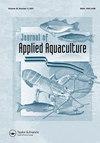Using various probiotic forms to boost sea cucumber (Holothuria scabra) performance and quality in Red Sea, Saudi Arabia
IF 0.8
Q3 FISHERIES
引用次数: 0
Abstract
ABSTRACT The aim of this study is to investigate the effects of probiotic products composed of different Bacillus spp on the survival and metamorphosis of sea cucumber larvae and tracks their impact on juvenile development, survival ratio and water quality. In addition to the control, three types of commercial probiotics, PLUS10, SKB01 and SKB0, were used. The experiment was conducted in three replications, each with 500 liter tanks containing 50,000 larvae (100 larvae/liter), over 40 days and in a completely randomized design. The experiment was conducted in three replicates, each with 500 liter tanks containing 50,000 larvae (100 larvae/liter), over 40 days and in a completely randomized design. The results showed that the larval metamorphosis and settlement are varied insignificantly with probiotics and significantly with days of application whereas no noticeable changes occur with SKB01 and SKB02. Furthermore, the survival rate decreased slightly with the PLUS10 (11.1 ± 4.2) compared to the control and falling dramatically with SKB01 and SKB02. Additionally, there was a marked improvement in larvae growth with PLUS 10. Finally, Finally, probiotics such as SKB01, SKB02, and PLUS10 enhance water quality, but they have a little negative impact on survival rates at this stage. As a result, it is recommended they can be utilized in the juvenile stage rather than the Auricularia stage. Consequently, further research on the impact of probiotics on the growth rates of Auricularia are urgently required.在沙特阿拉伯红海使用各种益生菌形式提高海参(Holothuria scabra)的性能和质量
摘要本研究的目的是研究由不同芽孢杆菌组成的益生菌产品对海参幼虫生存和变态的影响,并跟踪其对幼体发育、存活率和水质的影响。除对照外,还使用了三种类型的商业益生菌,PLUS10、SKB01和SKB0。实验分三次重复进行,每次用500升装有50000只幼虫(100只幼虫/升)的罐,历时40天,完全随机设计。该实验分三个重复进行,每个重复使用500升装有50000只幼虫(100只幼虫/升)的罐,持续40天,并采用完全随机设计。结果表明,益生菌对幼虫的变态和沉降影响不大,而SKB01和SKB02则没有明显变化。此外,与对照组相比,PLUS10的存活率略有下降(11.1±4.2),SKB01和SKB02的存活率显著下降。此外,PLUS 10显著改善了幼虫的生长。最后,SKB01、SKB02和PLUS10等益生菌可以改善水质,但对现阶段的存活率有一定的负面影响。因此,建议在幼年期使用,而不是在黑木耳期使用。因此,迫切需要进一步研究益生菌对黑木耳生长速率的影响。
本文章由计算机程序翻译,如有差异,请以英文原文为准。
求助全文
约1分钟内获得全文
求助全文
来源期刊

Journal of Applied Aquaculture
Environmental Science-Ecology
CiteScore
3.20
自引率
0.00%
发文量
38
期刊介绍:
The Journal of Applied Aquaculture is a platform for the sharing of practical information needed by researchers to meet the needs of investors, farm managers, extension agents and policy makers working to adapt aquaculture theory to achieve economic and food security objectives in the real world. The journal emphasizes multi-disciplinary research and case studies that propose financially and logistically viable solutions to observable problems.
 求助内容:
求助内容: 应助结果提醒方式:
应助结果提醒方式:


